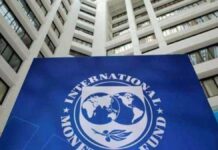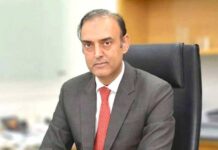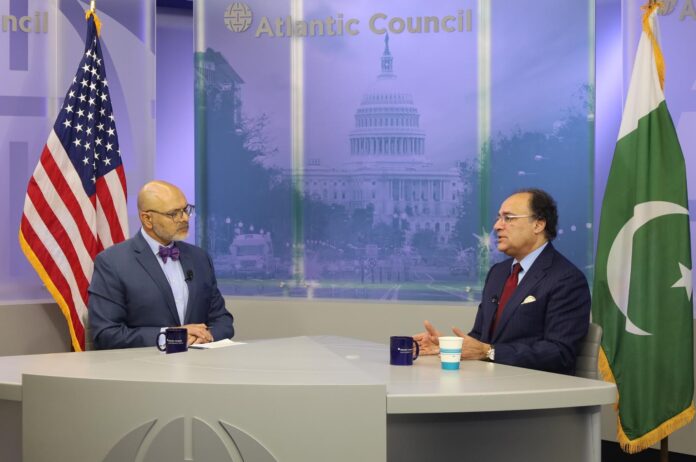Federal Minister for Finance and Revenue Muhammad Aurangzeb said Tuesday that Pakistan does not need too many policy prescriptions, but execution of the already signed policies.
Muhammad Aurangzeb is leading Pakistan’s delegation in the IMF and World Bank-2024 Spring Meetings in Washington DC where he highlighted the country’s roadmap to cope with the challenges and put the economy on a sustainable growth trajectory.
In an interactive session with Atlantic Council’s Geo-Economics Center and South Asia Center titled “Opportunities and Challenges for the Pakistani Economy through 2024 and Beyond”, he outlined Pakistan’s key measures to achieve economic stabilisation by increasing tax-to-GDP ratio, undertaking end-to-end digitalisation of FBR, reforming state-owned enterprises (SOEs), boosting exports, increasing remittances, improving the business environment and attracting foreign direct investments.
Sharing Pakistan’s current economic landscape, he said the country had entered a much better shape this year than at the beginning of the last year, adding it had to do a lot with the nine-month SBA programme which in turn “ushered in a macroeconomic stability for the country.”
He said the country’s overall GDP was moving in the right direction, although the headline number was not that significant, however, different sectors were performing well.
He said, agriculture witnessed 5% growth owing to bumper crops; the services sector was moving quite well and inflation had come down from the peak of 37%-38% to closer to 20%-22% while the exchange rate was stable.
“So all of this has moved us in the right direction, now we will take it forward from here [for which] we need, in the first instance, permanence in the macroeconomic stability,” adding the government had initiated discussion with the IMF on the larger and extended programme that would help put the economy on a sustainable growth path.
The finance minister was of the view that the ”timely decisions and timely executions” were the key aspects to run even the smallest institution or the largest country on the planet . . .”
He said Pakistan does not need too many policy prescriptions as “we have known what and why, not for years but decades.” We know to focus on tax-aspect, tax-to-GDP, investment-to-GDP, increasing exports, getting the circular debt in order and accelerating the privatisation agenda.
”These are some of the things that my predecessors had been signing with the Fund. It is time for us to start moving with execution of some of these aspects,” he said.
Aurangzeb said Pakistan was looking for a larger and extended programme as it would need a two-three-year time period to go through the structural reforms programme.
The finance minister termed discussions with the IMF mission that visited Pakistan last month for the 2nd and final review of the SBA programme ‘very constructive and positive.’
Talking about revenue generation, the minister said the government on a short-term basis intends to cut down on the leakages [in revenue collection] and ensure speedy decisions by tax tribunals.
More importantly, he said, Pakistan needed to bring untaxed and under-taxed sectors in the tax network, under the medium-term agenda “We have started moving in that direction,” he remarked.
Under the transformation programme, he said the country had already started the process of end-to-end digitalisation of the tax system to minimize human intervention.
This week, he said, world-class consultants were being shortlisted and hopefully would be appointed by the end of the current month, with the mandate to work on the design framework and its implementation, ensuring transparency.
“The client experience will bring back trust and confidence into the tax authority, which is very important.”
Commenting on other measures to stabilise the national economy, the finance minister stressed the need for controlling expenditures, operational expenditures, and infrastructure development with public-private partners at the federal and provincial levels.
Quoting a study of the World Bank, he said, the GDP per capita could go up by 26% if the issues related to human capital, especially the stunting growth were addressed. “But we can’t do it till we have the fiscal space.”
Aurangzeb also talked about operationalisation of a ‘single-window’ mechanism for doing business in Pakistan not only for foreign investors but starting it for domestic investors.
He said information technology and agriculture sectors presented ‘huge sights’, and different projects in metal and mining fields like Reko Diq could become a real game changers for Pakistan.

























HOW I FINALLY RECOVERED MY LOST BITCOIN:
Do you need help on how to recover lost or stolen Bitcoin from fake investment scammers? I lost all my Bitcoin to a fake investment scam to someone I met online. After losing my Bitcoin investments, I was determined to find a solution. I started searching for help legally to recover my funds, and I came across a lot of Testimonies about GEO COORDINATES HACKER. I am incredibly grateful for the exceptional service, and wanted to inform you all about this positive outcome. They emphasized their excellent strategy for Bitcoin recovery. In order to assist people and companies in recovering their lost or stolen cryptocurrencies. They guarantee that misplaced bitcoins have an opportunity to be recovered with their excellent services. If you or anyone you know ever finds yourselves in a similar unfortunate situation, I highly recommend reaching out to GEO COORDINATES HACKER. Contact Info Email:
( [email protected] )
Email; ( [email protected] )Telegram ( @Geocoordinateshacker )Website; https://geovcoordinateshac.wixsite.com/geo-coordinates-hack